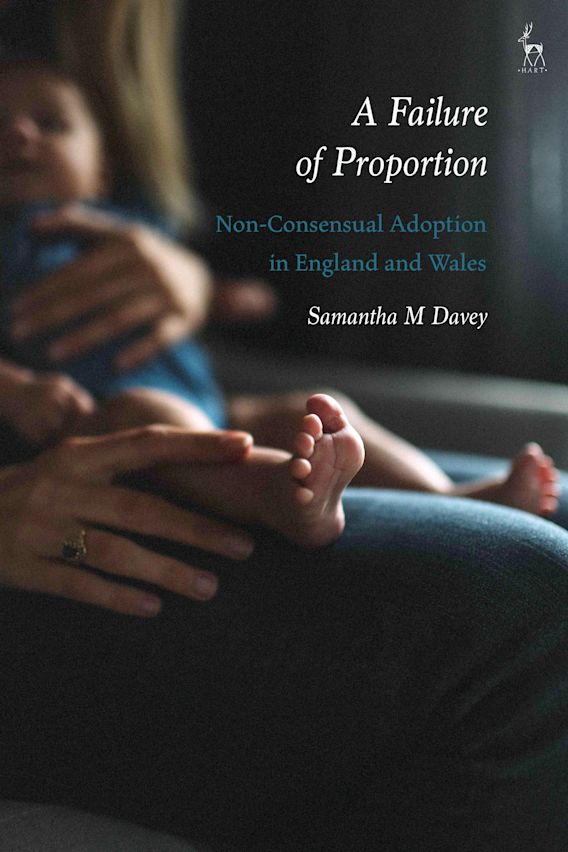Interview with Samantha Davey about her book, A Failure of Proportion
Our member, Dr Samantha Davey (Essex, UK) talks about her book, A Failure of Proportion: Non-Consensual Adoption in England and Wales (Bloomsbury, 2020).

Q: What is this book about?
This book explores non-consensual adoption – an area of law which has sparked considerable debate amongst academics, practitioners and the judiciary nationally and internationally. The book primarily covers the law in England and Wales but draws on examples from Scottish Law (where relevant and appropriate to do so). The emphasis of this book is on the circumstances in which non-consensual adoption may be regarded as a proportionate measure and when less severe forms of intervention, such as long-term foster care or kinship care, may also meet children's needs while providing protection to children's rights under the European Convention on Human Rights.
The book builds on existing literature on adoption law but takes the discussion in new directions, placing an emphasis on the need to closely scrutinise children's and parents' rights at all stages of the adoption process, not simply when parents appeal against the making of an adoption order. A unique feature of this book is its emphasis on routinely incorporating key provisions from the United Nations Convention on the Rights of the Child into analysis when determining whether an adoption order is a proportionate measure.
Q: What made you write this book?
The issue of non-consensual adoption in England and Wales is not only controversial at national level. Current adoption practice in England and Wales has caught the attention of the Council of Europe, which has expressed concern about how existing legislation and practice on adoption in England and Wales may violate children’s rights. In other words, there are concerns that not all adoptions which take place without parental consent, are proportionate.
The government policy objective is one which has been carried over by successive governments (Conservative, Conservative-Lib-Dem, and New Labour). The problem which has led to the encouragement of non-consensual adoption is the excessive number of children in care, including foster care placements and group care homes, especially children from ethnic minorities.
Although the aim to reduce the numbers of children in care is, in itself, laudable, it creates challenges. Specifically, this process, coupled with the 26-week care proceedings timeline, means that local authorities are encouraged to pursue more adoptions and faster. This means that suitable alternative placements with kinship carers may not be fully explored, which means children may be denied the right to be placed with birth family (rights covered under Article 8 right to a private and family life, as well as a cluster of familial and identity rights, under the UN Convention on the Rights of the Child, especially Articles 5, 7 and 8).
The increase in the number of adoptions (without parental consent) of migrant children and adoption of children from other European countries (in particular, from former Soviet bloc countries) adds further weight to the need to re-evaluate existing law. What appears, at first glance, to be a national issue is increasingly becoming an international issue.
Excerpt from the book:
A picture is worth a thousand words. In a well-publicised YouTube video, which later gave rise to the case of Re J (A Child), 2 a social worker can be seen forcibly removing a baby from a crying mother’s arms. The video is highly emotive and disturbing, and yet the parents’ situation is just one example of many troubling stories alleging that the making of a care order and a subsequent non-consensual adoption have been disproportionate measures. Stories emphasising the lack of transparency in adoption proceedings and the perception that parents’ and children’s rights receive insufficient protection in non-consensual adoption cases can be discovered on divergent sources online, including the BBC, The Telegraph, The Guardian, The Daily Mail and various blogs. Television documentaries, online petitions and freedom of information requests have been made.
Non-consensual adoption is controversial and has, in recent years, been scrutinised closely in the UK superior courts. At present, the Adoption and Children Act 2002 allows non-consensual adoption in England and Wales even though it interferes with parents’ and children’s human rights under the European Convention on Human Rights.
This author expresses concern about the application of the proportionality principle in English law in non-consensual adoption cases. It is not disputed that adoption orders can, in some circumstances, be the best measure available to protect children’s rights and welfare once children have been removed into care. There may be cases where children will not be safe in the care of their parents, and where ongoing contact between children and parents may not be in the children’s best interests due to severe and even life-threatening neglect or abuse. In other circumstances, children themselves do not wish to live with or maintain relationships with their parents due to the severe neglect and/or physical or emotional abuse they have experienced. In these situations, it will not be in their best interests to be reunited with their parents. In the absence of other suitable alternatives, children’s rights may be best protected via adoption orders.
However, adoption orders are sometimes made in circumstances where less intrusive and equally effective measures are available to protect children from harm. These measures include court orders (e.g., supervision orders, care orders and special guardianship orders) and alternatives such as kinship care and the provision of practical and financial assistance to families vis-à-vis the state. Furthermore, in circumstances where parents are unfit, it may still be possible for children to have safe and beneficial contact with their birth parents via open adoption. The question is then whether adoption should be the first choice to ensure stability and permanence for children, or the last resort when other options have been exhausted?